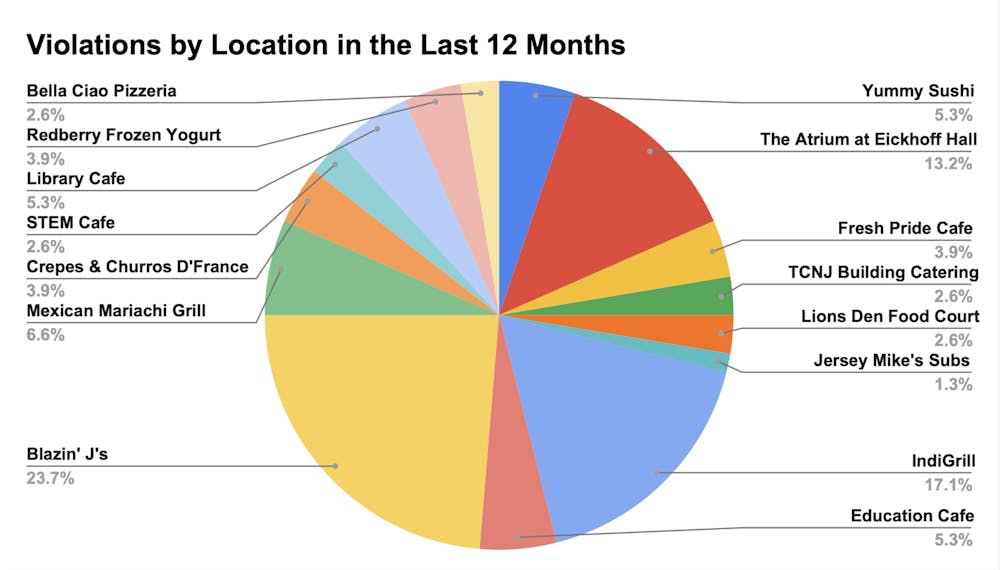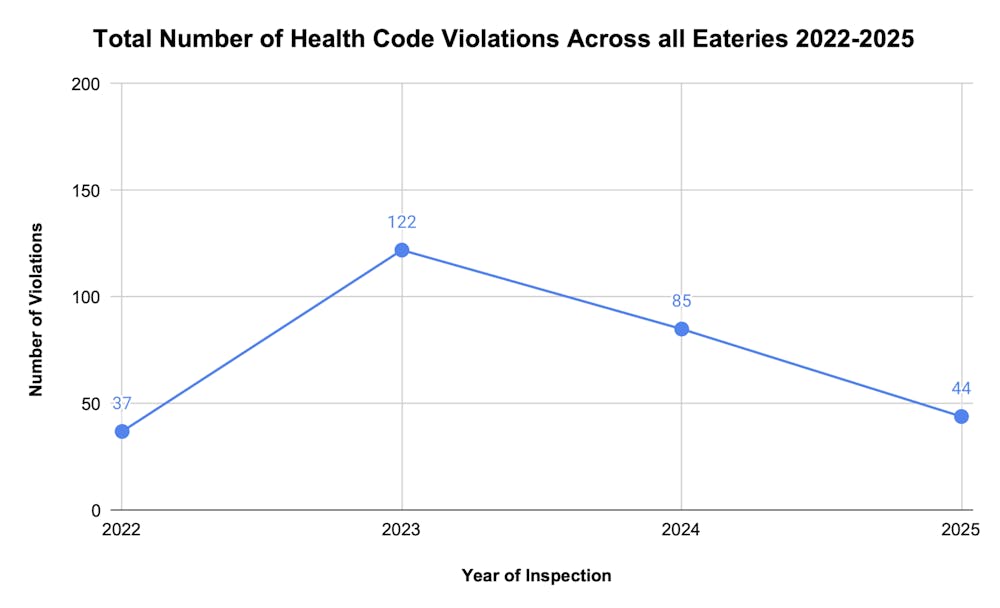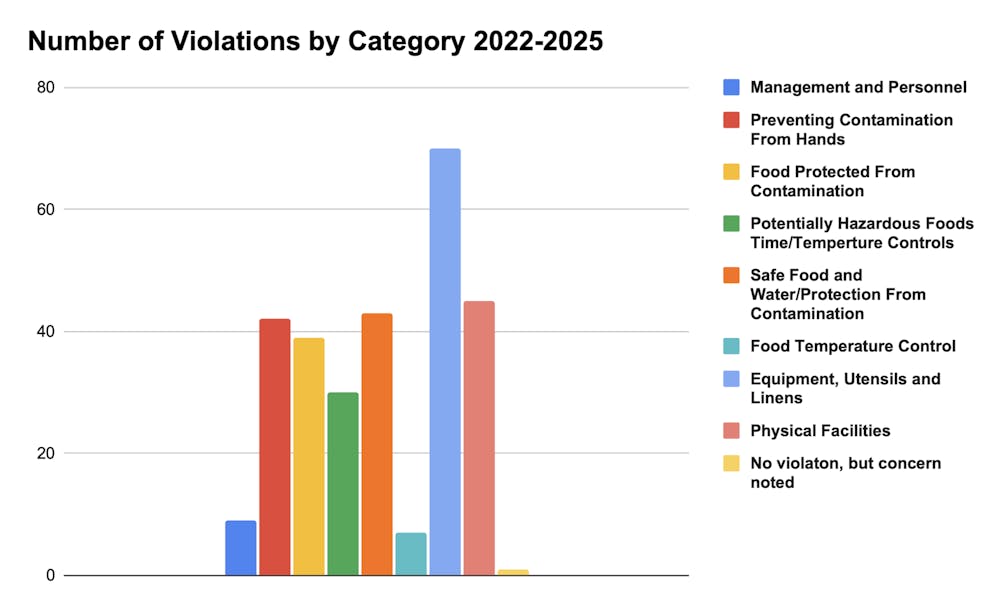By Isabella Darcy
Managing Editor
Patrick Whitehead stopped into The Atrium at Eickhoff Hall last spring to satiate his hunger with some chicken from the Wok station. An hour later, he began to feel the first signs that something was not right.
“My stomach was a mess. I was throwing up all night,” said Whitehead, a sophomore criminology and psychology double major. “It wasn’t a great experience.”
What Whitehead didn’t know that spring day is that The Atrium at Eickhoff has consistently not been in full compliance with sanitary regulations — and it’s not the only eatery at the College that has failed to fully comply.
The Ewing Township health department, over the last three years, has flagged eateries at the College for 288 health code violations involving unclean food contact surfaces, improperly maintained kitchen equipment, poor handwashing practices and more, according to records provided to The Signal through a public records request.
Overall violation totals decline, though some eateries remain repeat offenders
Sixty percent of eateries available on campus, in Campus Town and through the College’s catering services violated at least one health code standard in the last 12 months, contributing to 76 total violations.
Blazin’ J’s in Campus Town was responsible for nearly one-fourth of all violations, with 18 total. The most recent inspection of the eatery in February uncovered violations, including but not limited to: multiple filthy surfaces, a dirty and disorganized dishwasher and an employee neglecting to wash their hands after handling raw chicken.
Since opening in 2022, Blazin’ J’s has annually accrued violations due to a repeated lack of cleanliness. It is responsible for the second-largest number of violations across all eateries in the past three years.
Blazin’ J’s co-owner Gary Danehower told The Signal that issues related to food safety are the most concerning to him. The restaurant immediately works to resolve these types of issues when they arise by correcting them on the spot and educating employees on proper protocols, he said.
Danehower emphasized, and records corroborate, that while his restaurant has accumulated violations related to food safety, none of those violations were due to food — specifically chicken — being undercooked. The most important thing to Danehower is that food is cooked properly and that ingredients are fresh to prevent foodborne illness, which is why Blazin’ J’s pays close attention to the temperature of its products and does weekly turns of its inventory.
Another way Blazin’ J’s is mitigating food safety issues is by requiring all its employees to go through a food handler certification course. This obligation was implemented in February.
“We pride ourselves on food safety, so we’re continuing to improve,” Danehower said. “[We are] not perfect but improving.”

Fifteen dining locations violated health code standards in the last year. (Chart by Isabella Darcy)
IndiGrill and The Atrium at Eickhoff Hall followed as the only other eateries with violation counts in the double-digits since this time last year.
The Atrium at Eickhoff Hall was primarily not in compliance with health code standards due to unkempt facilities. Mold-like substances were discovered in an ice machine (a recurring finding across many eateries), shelves were rusted in a walk-in fridge and a plumbing system needed updating.
At IndiGrill, there were fewer violations than in the past. The 6-year-old Campus Town restaurant has consistently accumulated violations that predominantly relate to improper handwashing, incorrect storage of items that touch food and inappropriate handling of food.
Conditionally satisfactory ratings were issued to IndiGrill in 2022, 2023 and 2024, because it was not in substantial compliance with sanitary requirements. While the violations did not pose an immediate health threat, they still required correction.
IndiGrill is continuing to work on improving its food safety, according to Naveen Kumar, the restaurant's owner.
“I have hired a third party who visits once a quarter to conduct checks and educate on preventing future violations,” Kumar told The Signal in a written statement.
Like IndiGrill, the total number of food safety violations across all of the College’s food establishments has declined in recent years, even though each individual eatery has not experienced improvement.

The most health code violations by year since 2022 occurred in 2023. (Chart by Isabella Darcy)
Since the COVID-19 pandemic partially shut down dining at the College until 2022, the amount of food safety violations across all eateries peaked at 122 in 2023, lessened to 85 in 2024 and dropped to 44 in the first 10 months of 2025.
To address sanitary concerns at on-campus dining locations and catering services, the College works with its dining partner, Sodexo, and the Ewing Township Health Department, according to Emily Dodd, the interim head media relations officer at the College.
The corrective process begins with immediately fixing any issue and verifying that the restorative actions taken were effective in solving the original problem. The College then documents the remediation and provides additional staff training if needed. Re-inspections by the health department also follow in instances where a conditionally satisfactory or unsatisfactory rating is issued.
In addition, the College conducts routine internal audits to ensure ongoing compliance and food safety, and would escalate any persistent issue through corrective action plans and increased monitoring, according to Dodd.
Most violations involve equipment and cleanliness
When food safety inspections are conducted, health codes are broken down by category. Most codes violated by eateries at the College fell under the “Equipment, Utensils and Linens” classification, meaning dining locations failed to properly clean, sanitize, maintain or use such items to prevent food contamination.
Codes under the “Physical Facilities” classification were the second most violated, indicating that establishments’ physical structure, maintenance or general sanitation were inadequate. Other recurring issues were related to food not being kept at the required temperature, food being stored incorrectly, and staff lacking knowledge of or erroneously following food safety standards.

Health code violations are separated by category on sanitation inspection records. (Chart by Isabella Darcy)
A broader look at health inspection ratings
In Ewing Township, N.J., dining establishments are typically inspected by the health department annually to ensure that state standards are met, according to the township’s website.
Eating establishments at the College have overwhelmingly received satisfactory scores from health inspectors, meaning they were found to be operating in substantial compliance with state health code. Even with satisfactory ratings, violations can be present.
Some conditionally satisfactory ratings have been issued, as has one unsatisfactory rating in September 2023, when the health department was called to The Atrium at Eickhoff for an emergency inspection, following a grease fire at the Wok station. In these cases, the health department re-inspected eateries within 30 days. Most violations were corrected by re-inspection. However, in cases similar to IndiGrill and Blazin’ J’s, issues sometimes recurred from year to year.
As this year comes to an end, records will soon show whether or not the annual downward trend in violations has carried on.







